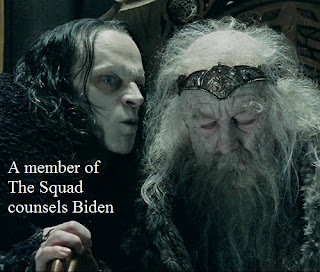These are the reflections of a Secular Franciscan. I look not only at my own spiritual journey, but also at issues of life, economic and social justice, morality, the arts, and more through the lens of Franciscan Spirituality.
Tuesday, July 30, 2024
Wednesday, July 24, 2024
Tuesday, July 23, 2024
Sunday, July 21, 2024
Friday, July 19, 2024
Joy Reid Clerihew
Wednesday, July 17, 2024
The Flying Inn
One of my reading goals this year was to read a novel by G. K. Chesterton that I had not yet read. I just finished The Flying Inn.
Pax et bonum
Chesterton and Whitman
Scott Hubbard explores this issue in Transpositions ((2/20/2017)
The Orthodoxy Of Leaves Of Grass: The Imaginative Visions Of G.K. Chesterton And Walt Whitman In Dialogue
Walt Whitman is not likely to appear on anyone’s list of great Christian poets. And with reason. From the first publication of Leaves of Grass in 1855, to his death in 1892, the good gray poet had cosied with Emersonian Neoplatonism, drafted plans for ‘The Great Construction of the New Bible’ and even accorded the figure of Satan a place within the Holy Quaternity of God. [1] He is large and contains multitudes, but Chalcedonian orthodoxy is not one of them. The problem is that Whitman’s personal heterodoxies may keep his name from appearing on any list of great poets written by a Christian. However, one Christian who in his own lifetime offered hearty dissent to this rule was none other than

When Chesterton compiled his 1905 essay series Heretics to expose the philosophical inadequacies of the literati of the past half-century, not only did he spare Whitman from his critical scythe, but the American poet received accolade as a type of noble pagan. Indeed, for a pre-conversion Chesterton, Whitman was ’one of the greatest men of the nineteenth century’. [2] And while this is certainly a tendentious claim from England’s Catholic Colossus, it is not one that his later work shows any trace of recanting. In fact, the English apologist and the American bard had imaginative visions that greatly overlap in scope and focus.
Chesterton sensed a kindred spirit in Whitman on at least three key motifs, which may help to illuminate the value of Whitman’s poetry from a specifically Christian perspective. We will now consider those three motifs, introduced by an example of their occurrence in Whitman’s great poem Song of Myself. Finally, we will posit one point of divergence stemming from the third motif to suggest a possible difference in the ethical applications of their respective imaginative visions.
Joie-de-Vivre—Swiftly arose and spread around me the peace and joy and knowledge/that pass all the art and argument of the earth;/And I know that the hand of God is the elderhand of my own,/And I know that the spirit of God is the eldest brother of my own,/And that all the men ever born are also my brothers . . . . and the women my sisters and lovers,/And that a kelson of the creation is love. [6] In his chapter, ‘Omar and the Sacred Vine,’ from Heretics, Chesterton repudiates the melancholy escapism of Khayyam-Fitzgerald in favor of ‘a serious joie-de-vivre like that of Walt Whitman.’ [7] The idea of joie-de-vivre is not simply a lazy insistence that everything will be okay, but a permanent joy based on the good nature of things. This is the joyful abandon of Wisdom in Proverbs, ‘Delighting in him day after day, ever at play in his presence, at play everywhere on his earth, delighting to be with the children of men.’ [8] This creaturely joy properly responds to the ‘Miracle of Being’ of the preceding point. The gift of existence is in fact delightful, and Whitman rejoices accordingly.

Chesterton’s affinities for Whitman’s poetry are well-founded. The two writers have imaginative visions that apprehend the wonder and humility that humans should feel at the simple miracle of being, that ground real joy in the ancient meaning and mystery of the universe, and compel a profound respect and charity for one’s fellow human beings.
These visions are both Edenic and eschatological; they look back to the primitive and final harmony of creation and call us to practice wonder, joy and self-giving love, even in this present age.
However, it is precisely in the state of this present age that the two visions differ. Set against Chesterton’s love for both creation and his neighbor is his intuition that ‘in some way all good was a remnant to be stored and held sacred out of some primordial ruin . . . or wreck.’ [12] This idea of the wreck (a more vivid image than the traditional ‘Fall’) of humanity in sin implicates both world and self in a brokenness that world and self alone cannot heal, and must be redeemed from the outside.
As such, one essential difference between the two imaginative visions exist. While both exhort us to empathize with our neighbor’s situation and lovingly give of ourselves for his or her good, Chesterton’s vision is able to go further in that it is able to locate the self’s own guilt in the suffering of the neighbor. Whitman’s poetry of course demonstrates deep, even kenotic care for the suffering other, but for Chesterton’s, and Christianity’s vision, such care might not be enough for the best human relationships. It may be that an imaginative vision demands a recognition of universal human brokenness, as well as human dignity, to rightly guide us in loving our neighbors as ourselves.
[1] See Malcolm Cowley’s introduction to Leaves of Grass, The First (1855) Edition, (New York: Penguin, 1959), 14, 28. All subsequent quotations from Song of Myself are taken from this edition.
[2] D. Collins, ed., Lunacy and Letters, (New York: Sheed and Ward, 1958), 62.
[3] Song of Myself, 6.90-91.
[4] G.K. Chesterton, Orthodoxy, from Collected Works: Volume I: Heretics, Orthodoxy, The Blatchford Controversies, ed. David Dooley, (San Francisco: Ignatius Press, 1986), 262.
[5] Song of Myself, 23.488.
[6] Song of Myself, 5.82-86.
[7] Heretics, 96.
[8] New Jerusalem Bible, (New York: Doubleday, 1990), 975.
[9] Song of Myself, 1.1-3.
[10] Heretics, 189.
[11] Heretics., 188.
[12] Orthodoxy, 268.
Scott Hubbard is an MLitt student in the Institute for Theology, Imagination and the Arts (ITIA) at the University of St Andrews. His research Scott considers the central relationship between speaker and addressee(s) in Walt Whitman’s poem Song of Myself. Scott is particularly interested in how Whitman’s poem might interact with and illuminate the meanings of Christ’s command to love one’s neighbor as oneself, and how the reception of such an interaction might affect concepts of selfhood and relationship in American culture, both within and outside of the Church.
Pax et bonum
Tuesday, July 16, 2024
Hey Walt!
I was looking for the next poetry collection to read - having read all the poems of Robert Frost and Emily Dickinson, and all the sonnets of Shakespeare. At the library I spotted a collection of the sonnets of Edna St. Vincent Millay, so I took it out. I started reading it. I like sonnets, and she's a good poet, but I just could not get into it.
Sunday, July 14, 2024
New York Proposition 1: The Parent Replacement Act
Sunday, July 7, 2024
Busman's Honeymoon - Sayers Goal Met
Thrones, Dominations, the unfinished Sayers manuscript completed by Jill Paton Walsherisp, Apparently this picks up the story after Peter and Harriet's honeymoon in Europe, but Sayers abandoned it and said she did not like it. Except for a couple of short stories, she never published any more Wimsey tales.
Saturday, July 6, 2024
Thursday, July 4, 2024
Santa's Diary Update
Wednesday, July 3, 2024
Joe Biden Over the Years
Since last Thursday's debate, there has been a flurry of pundits, media types, and Democratic officials saying they didn't know he had gotten that bad.
lingers in his basement listening to Haydn.
But he's been seen in many a horror feature
in supporting roles as yet another swamp creature.
Former Vice President Joe Biden
avoids mention of the works of John Dryden.
He fears voters thinking "it is all a cheat."
and claims that certain "people favor this deceit."
The eyes of former Vice President Biden
suddenly began to widen.
"Wait, you mean now that they say I've won,
people actually expect me to get something done???"
The installation of Joe Biden
was greeted with laughter from Sauron.
Meanwhile, they giggled at Planned Parenthood,
"Our financial prospects are looking good!"
Former Vice President Joe Biden
is content to let gender definitions widen.
He has himself long used the trick
of identifying as a devout Roman Catholic.
Former Vice President Joe Biden
caused some Royal eyes to widen.
His press people sighed, for from the start,
they've been battling accusations he's just an old fart.
Former Vice President Joe Biden
His most recent verbal fail
was his cringe-worthy dead dog tall tale.
Tuesday, July 2, 2024
Lord Peter Wimsey
Unnatural Death (1927) (U.S. title originally The Dawson Pedigree)
The Unpleasantness at the Bellona Club (1928)
Strong Poison (1930)
The Five Red Herrings (1931)
Have His Carcase (1932)
Murder Must Advertise (1933)
The Nine Tailors (1934)
Gaudy Night (1935)
Busman's Honeymoon (1937)
Thrones, Dominations (1998) Unfinished Sayers manuscript completed by Jill Paton Walsh













